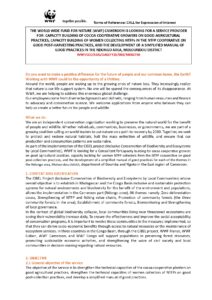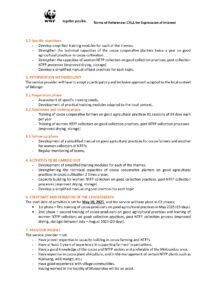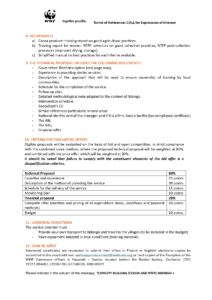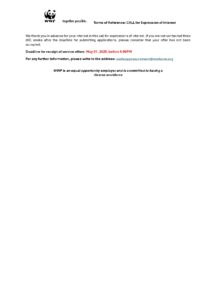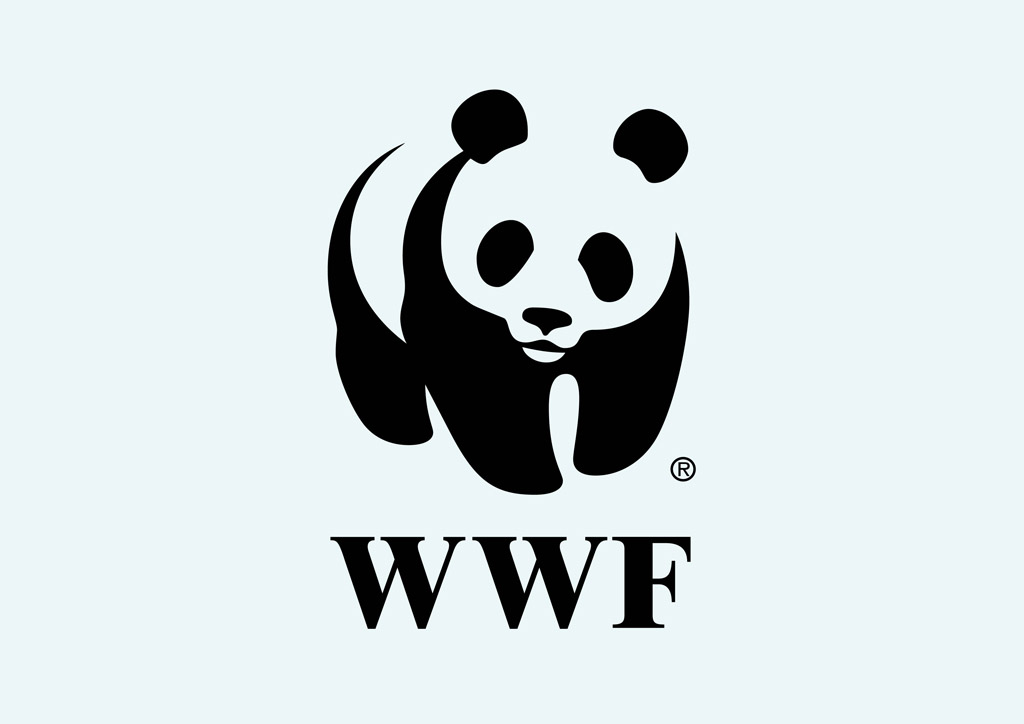THE WORLDWIDE FUND FOR NATURE (WWF) CAMEROON IS LOOKING FOR A SERVICE PROVIDER/CONSULTANT FOR THE STRUCTURING OF 02 COOPERATIVES (01 FOR COCOA AND 01 FOR NTFP), ACCORDING TO THE OHADA UNIFORM ACT AND THE STRENGTHENING OF THE ORGANIZATIONAL AND MANAGERIAL CAPACITIES OF THEIR LEADERS: IN THE NDONGO AREA, MOLOUNDOU DISTRICT
1. CONTEXT AND JUSTIFICATION
The CIBEL Project (Inclusive Conservation of Biodiversity and Ecosystems by Local Communities) whose overall objective is to establish in Madagascar and the Congo Basin inclusive and sustainable protection systems for natural environments and biodiversity for the benefit of the environment and populations, allows the implementation in the Cameroon part (Ndongo zone), 06 themes namely: Zero deforestation cocoa, Strengthening of NTFP and fishing value chains, Promotion of community forests (the three community forests in the area), Establishment of community forests, Biomonitoring and Strengthening of local governance.
In a context of global biodiversity collapse, local communities living near threatened ecosystems are seeing their vulnerability increase daily. To ensure the effectiveness and improve the social acceptability of conservation programs, it is important to involve these communities in the measures implemented, so that they can derive socio-economic benefits through access to natural resources or the maintenance of ecosystem services. In three countries in the Congo Basin, through the CIBEL project, WWF France, WWF Gabon, WWF Cameroon, and WWF Congo will support populations in preserving forest resources, promoting sustainable economic activities, and strengthening the voice of civil society and local communities in decision-making regarding natural resources.
2. OBJECTIVE
2.1 General objective of the service
Support the transformation of existing CACAO producer associations and women collectors of NTFPs into cooperatives per the OHADA Uniform Act, and strengthen the technical, organizational and managerial capacities of their leaders.
2.2 Specific objectives
– Raise awareness and train existing producer organizations on OHADA law for cooperative societies.
– Support the legal and administrative process of transformation into a cooperative.
– Establish governance bodies per the OHADA Uniform Act.
– Train managers on their roles and responsibilities, on the administrative and financial management of a cooperative.
3. INTERVENTION METHODOLOGY
The service provider will have to adopt a participatory and inclusive approach adapted to the local context of Ndongo:
3.1 Preparatory phase
– Organizational diagnosis of existing producer organizations in the localities of Ndongo, Leke, Mindourou and Adjala up to Legoué;
– Assessment of specific training needs.
3.2 Awareness and training phase
– Information sessions on the OHADA Uniform Act in the local language if necessary.
– Training on cooperative principles with local examples
3.3 Legal structuring phase
– Support in drafting statutes;
– Support the holding of constituent general meetings.
– Assistance with administrative formalities in Moloundou and Bertoua for the creation of cooperatives.
3.4 Capacity building phase
– Capacity building on good governance, administrative and financial management
4. ACTIVITIES TO BE CARRIED OUT
– Organization of awareness sessions on the OHADA Uniform Act.
– Legal support for transformation into cooperatives.
– Establishment of governance bodies
– Training of members on their role and responsibility, on the administrative and financial management of the cooperative
– Development of simplified management tools.
5. EXPECTED RESULTS
– The existing cocoa producer organizations and women NTFP collectors in the Ndongo area and its surroundings are transformed into OHADA cooperatives (legally constituted and registered)
– Leaders are trained in managerial and organizational aspects.
– Governance bodies are established and operational.
– An internal control / internal audit mechanism for each cooperative is established and operational
– Management tools are available and mastered by managers.
6. START DATE AND DURATION OF THE CONSULTATION
The start date of the activities is set for May 2025, and the service will last forty-five (45) days
7. PROVIDER PROFILE
The service provider must:
– Have proven expertise in structuring OHADA cooperatives.
– Have at least 5 years of experience in supporting farmers’ organizations.
– Have a good knowledge of the cocoa and NTFP sector and preferably of the Moloundou area;
– Have good experience with village communities.
– Having worked in the locality of Moloundou will be an asset.
8. DELIVERABLES
a) Report on the transformation of producer organizations into OHADA cooperatives.
b) Leader Training Report ;
c) Report on the establishment of government bodies.
d) Report on the implementation of the internal control / internal audit mechanism.
e) Report on the implementation of management tools.
f) Final mission report
9. THE TECHNICAL PROPOSAL INCLUDES THE FOLLOWING DOCUMENTS:
– Cover letter: Brief description (one page max);
– Experience and expertise in providing similar services.
– Description of the approach that will be used to ensure ownership of cooperatives by local communities.
– Schedule for the completion of the service.
– Follow-up plan.
– Detailed methodological note adapted to the context of Ndongo
– Intervention Schedule
– Consultant’s CV
– Similar references, particularly in rural areas
– National identity card of the manager, and if it is a firm, have a tax file (tax compliance certificate)
– The RIB,
– The NIU,
– A financial offer
10. CRITERIA FOR EVALUATING OFFERS
Eligible proposals will be evaluated based on full and open competition, in strict compliance with the combined score method, where the proposed technical proposal will be weighted at 80%, and combined with the price offer, which will be weighted at 20%.
It should be noted that failure to comply with the constituent elements of the bid offer is a disqualification criterion.
Technical Proposal: 80%
Expertise and experience: 25 points
Description of the method of providing the service: 30 points
Schedule for the delivery of the service: 15 points
Monitoring plan: 10 points
Financial proposal: 20%
Complete offer (mentioning and pricing of all expenditure items, conditions and payment methods): 10 points
Budget: 10 points
11. LOGISTICAL CONDITIONS
The service provider must:
– Provide your transport to Ndongo and travel to the villages (to be included in the budget)
– Have equipment adapted to local conditions (training material);
10. HOW TO APPLY
Interested candidates are requested to submit their offer in French or English to the email address: wwfcopprocurement@wwfcam.org or at the WWF Cameroon offices in Yaoundé – Bastos, located behind the Bastos factory. Contacts: (237) 222217084/83, 222007703, 677500035, 699503621
Please indicate in the subject of the message, “COOPERATIVE STRUCTURING (COCOA AND NTFP) NDONGO»
We thank you in advance for your interest in this call for expressions of interest. If you are not contacted three (03) weeks after the deadline for submitting applications, please consider that your offer has not been accepted.
Deadline for receipt of service offers: 01 May 2025, before 5:00 PM
For any further information, please write to the address: wwfcopprocurement@wwfcam.org
WWF is an equal opportunity employer and is committed to having a Diverse workforce.
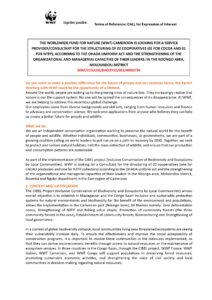
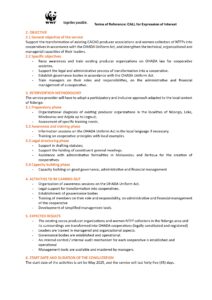
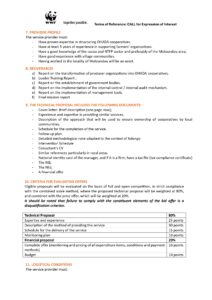
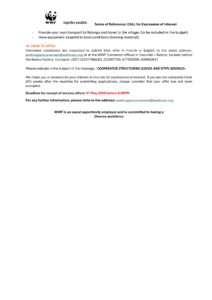
THE WORLD WIDE FUND FOR NATURE (WWF) CAMEROON IS LOOKING FOR A SERVICE PROVIDER FOR: CAPACITY BUILDING OF COCOA COOPERATIVE GROWERS ON GOOD AGRICULTURAL PRACTICES, CAPACITY BUILDING OF WOMEN COLLECTING NTFPs IN THE NTFP COOPERATIVE ON GOOD POST-HARVESTING PRACTICES, AND THE DEVELOPMENT OF A SIMPLIFIED MANUAL OF GOOD PRACTICES IN THE NDONGO AREA, MOLOUNDOU DISTRICT
1. CONTEXT AND JUSTIFICATION
The CIBEL Project (Inclusive Conservation of Biodiversity and Ecosystems by Local Communities) whose overall objective is to establish in Madagascar and the Congo Basin inclusive and sustainable protection systems for natural environments and biodiversity for the benefit of the environment and populations, allows the implementation in the Cameroon part (Ndongo zone), 06 themes namely: Zero deforestation cocoa, Strengthening of NTFP and fishing value chains, Promotion of community forests (the three community forests in the area), Establishment of community forests, Biomonitoring and Strengthening of local governance.
In the context of global biodiversity collapse, local communities living near threatened ecosystems are seeing their vulnerability increase daily. To ensure the effectiveness and improve the social acceptability of conservation programs, it is important to involve these communities in the measures implemented, so that they can derive socio-economic benefits through access to natural resources or the maintenance of ecosystem services. In three countries in the Congo Basin, through the CIBEL project, WWF France, WWF Gabon, WWF Cameroon, and WWF Congo will support populations in preserving forest resources, promoting sustainable economic activities, and strengthening the voice of civil society and local communities in decision-making regarding natural resources.
2. OBJECTIVE
2.1 General objective of the service
The objective of the service is to strengthen the technical capacities of the cocoa cooperative planters on good agricultural practices, strengthen the technical capacities of women collectors of NTFPs on good post-collection practices, and develop a simplified manual of good practices.
2.2 Specific objectives
– Develop simplified training modules for each of the themes.
– Strengthen the technical capacities of the cocoa cooperative planters twice a year on good agricultural practices in cocoa cultivation.
– Strengthen the capacities of women NTFP collectors on good collection practices, post-collection NTFP processes (improved drying, storage)
– Develop a simplified manual of best practices for each topic.
3. INTERVENTION METHODOLOGY
The service provider will have to adopt a participatory and inclusive approach adapted to the local context of Ndongo:
3.1 Preparatory phase
– Assessment of specific training needs.
– Development of practical training modules adapted to the local context.
3.2 Awareness and training phase
– Training of cocoa cooperative farmers on good agricultural practices, 02 sessions of 04 days each per year
– Training of women NTFP collectors on good collection practices, post-NTFP collection processes (improved drying, storage)
3.3 Follow-up phase
– Development of a simplified manual on good agricultural practices for cocoa farmers and another for women collectors of NTFPs.
– Regular monitoring of teams,
4. ACTIVITIES TO BE CARRIED OUT
– Development of simplified training modules for each of the themes;
– Strengthening the technical capacities of cocoa cooperative planters on good agricultural practices in cocoa cultivation 2 times a year;
– Capacity building for women NTFP collectors on good collection practices, post-NTFP collection processes (improved drying, storage)
– Develop a simplified manual of good practices for each topic
6. START DATE AND DURATION OF THE CONSULTATION
The start date of activities is set for May 10, 2025, and the service will take place in 02 phases:
• 1st phase = first training of cocoa producers on good agricultural practices in May 2025 (15 days).
• 2nd phase = second training of cocoa producers on good agricultural practices and training of women NTFP collectors on good collection practices, post-NTFP collection process (improved drying, storage) between July – August 2025 (20 days).
7. PROVIDER PROFILE
The service provider must:
– Have proven expertise in capacity building in cocoa farming and NTFPs.
– Have at least 5 years of experience in supporting farmers’ organizations.
– Have a good knowledge of the cocoa and NTFP sectors and preferably of the Moloundou area.
– Have expertise in cocoa plant silviculture, and in the management of certain NTFP plants such as Njansang, wild mango, etc..
– Have good experience with village communities.
– Having worked in the locality of Moloundou will be an asset.
8. DELIVERABLES
a) Cocoa producer training report on good agricultural practices.
b) Training report for women NTFP collectors on good collection practices, NTFP post-collection processes (improved drying, storage);
c) Simplified manual on best practices for each theme available.
9. THE TECHNICAL PROPOSAL INCLUDES THE FOLLOWING DOCUMENTS:
– Cover letter: Brief description (one page max);
– Experience in providing similar services.
– Description of the approach that will be used to ensure ownership of training by local communities.
– Schedule for the completion of the service.
– Follow-up plan.
– Detailed methodological note adapted to the context of Ndongo
– Intervention schedule
– Consultant’s CV
– Similar references, particularly in rural areas
– National identity card of the manager, and if it is a firm, have a tax file (tax compliance certificate)
– The RIB,
– The NIU,
– Financial offer
10. CRITERIA FOR EVALUATING OFFERS
Eligible proposals will be evaluated based on full and open competition, in strict compliance with the combined score method, where the proposed technical proposal will be weighted at 80%, and combined with the price offer, which will be weighted at 20%.
It should be noted that failure to comply with the constituent elements of the bid offer is a disqualification criterion.
Technical Proposal 80%
Expertise and experience: 25 points
Description of the method of providing the service: 30 points
Schedule for the delivery of the service: 15 points
Monitoring plan: 10 points
Financial proposal: 20%
Complete offer (mention and pricing of all expenditure items, conditions, and payment methods):
10 points Budget 10 points
11. LOGISTICAL CONDITIONS
The service provider must:
– Provide your transport to Ndongo and travel to the villages (to be included in the budget)
– Have equipment adapted to local conditions (training material);
12. HOW TO APPLY
Interested candidates are requested to submit their offers in French or English/in electronic copies to the email address: wwfcopprocurement@wwfcam.org or hard copies at the Reception at the WWF Cameroon offices in Yaoundé – Bastos, located behind the Bastos factory. Contacts: (237)
222217084/83, 222007703, 677500035, 699503621
Please indicate in the subject of the message, “CAPACITY BUILDING (COCOA AND NTFP) NDONGO »
We thank you in advance for your interest in this call for expressions of interest. If you are not contacted three (03) weeks after the deadline for submitting applications, please consider that your offer has not been accepted.
Deadline for receipt of service offers: May 01, 2025, before 5:00 PM
For any further information, please write to the address: wwfcopprocurement@wwfcam.org. WWF is an equal opportunity employer and is committed to having a diverse workforce
